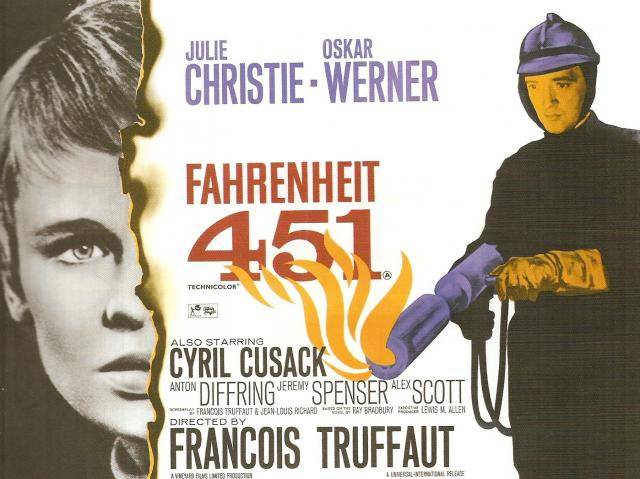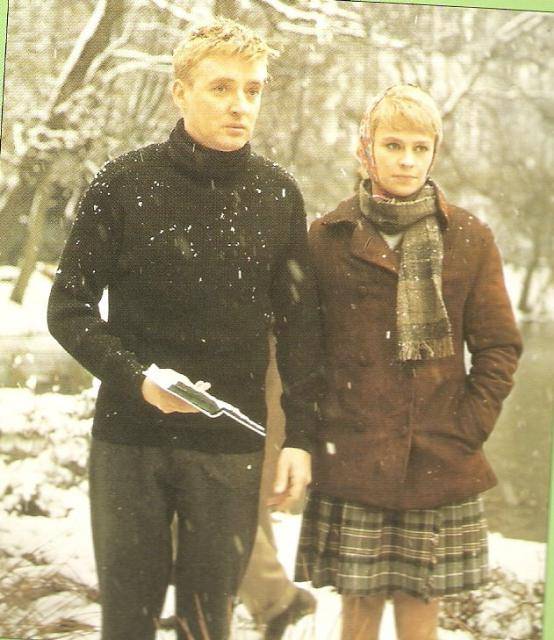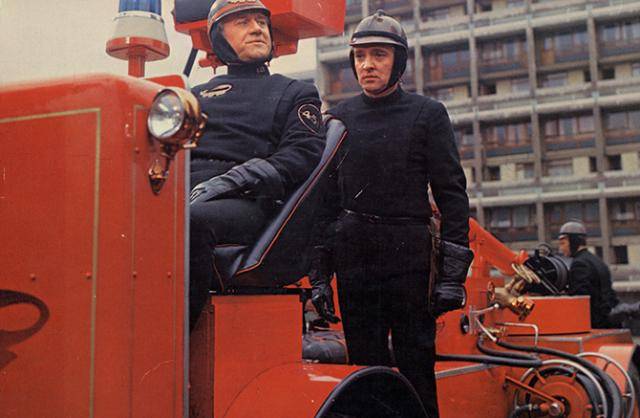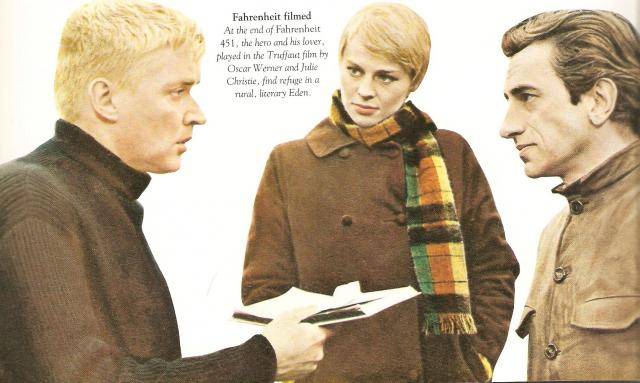Fahrenheit 451 (1966 UK)
Base of Galactic Science Fiction :: SCIENCE FICTION CINEMA :: Silver Age of Science Fiction Cinema
Page 1 of 1
 Fahrenheit 451 (1966 UK)
Fahrenheit 451 (1966 UK)
An ironic counterpoint to the highly-literate nature of the source novel and the premise, the credits at the beginning are spoken outloud rather than displayed as written words - yes, written words are not allowed within the confines of this universe. The film title refers to the temperature at which paper burns. I've always had a fondness for this one - it could easily have been pretentious and preachy, but director Truffaut somehow manages the right balance between messaging and entertainment. I think what also helps is Oskar Werner in the central role of Montag; it's up to him to carry the audience along and in this he's successful. Julie Christie is in dual roles - as his wife and as the new woman in his life - and she's stunning to look at as usual, but both her characters are detached, rather self-involved. Perhaps that's as it should be - it's Montag who must exhibit a passion which should absorb the viewer's interest.
The film is based on Ray Bradbury's famous sf novel; this posits an indefinite future and alternate reality where books are outlawed. Firemen in this reality are charged with tracking down and burning illegal books. Montag is one of these firemen, an experienced member of the force and up for promotion as the story begins. His captain (Cyril Cusack, creepy) tests him constantly, making sure that Montag is always thinking correctly - though maybe "thinking" is a misnomer here; the government has absolute control in this society and does all the important thinking for citizens. This is especially evident with Montag's wife (Christie), who is quite vacuous via pills and government videos. On an air tram on his way home one day, Montag meets another woman (also Christie), a supposed neighbor, and she asks him some odd questions about why books are not allowed and if he ever read one of those objects he burns. Soon after, Montag secretes his first book home - David Copperfield by Dickens - and begins to read it at night while his wife sleeps.
From a practical standpoint, many things don't make sense in this reality: at one point, Montag is told that firemen actually put out fires in some distant past and he responds with incredulity; but, someone has to put out fires in this reality - this is never explained. Files contain no paperwork, just photos, so how are records kept for reference on progress, information (computers? again, not explained). Since there are no books, no written works for the general populace, how and why would someone like Montag be able to read as he soon demonstrates he is able to? But, this is a fable, a commentary on totalitarianism. It's never spelled out by anyone exactly why books are against the law and how all this came to be, but we don't need to hear it: books are a conduit for free thinking and information; remove these and you should have a population of nearly-mindless drones, easy to control.
As expected in such a regime, the state and firemen usually get their intel from informants; people are encouraged to inform on one another. It's very similar to the Nazi regime. The film also makes some prescient points - about TV screens, for example, and how these become a person's companion or family. It's all part of a society's fabric in dehumanizing the members. For me, the key scene was when Montag (a heavy reader by this point) confronts his wife and her 3 female guests, suddenly reading to them a passage from some novel. One of the women suddenly begins to weep; it shows that just one paragraph is enough to draw out unexpected humanity from this person, as if the books are another kind of drug and people in this society are all in a state of negative withdrawal. BoG's Score: 7.5 out of 10
Trivia 451: early small role for Mark Lester as a schoolkid; he became a child star a couple of years later in Oliver! (68)
 Similar topics
Similar topics» Thunderbirds Are Go (1966 UK)
» The Bubble (1966)
» Around the World Under the Sea (1966)
» The Liquidator (1966)
» War of the Planets (1966 Italy)
» The Bubble (1966)
» Around the World Under the Sea (1966)
» The Liquidator (1966)
» War of the Planets (1966 Italy)
Base of Galactic Science Fiction :: SCIENCE FICTION CINEMA :: Silver Age of Science Fiction Cinema
Page 1 of 1
Permissions in this forum:
You cannot reply to topics in this forum











